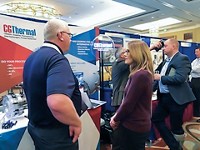Advertisement
Grab your lab coat. Let's get started
Welcome!
Welcome!
Create an account below to get 6 C&EN articles per month, receive newsletters and more - all free.
It seems this is your first time logging in online. Please enter the following information to continue.
As an ACS member you automatically get access to this site. All we need is few more details to create your reading experience.
Not you? Sign in with a different account.
Not you? Sign in with a different account.
ERROR 1
ERROR 1
ERROR 2
ERROR 2
ERROR 2
ERROR 2
ERROR 2
Password and Confirm password must match.
If you have an ACS member number, please enter it here so we can link this account to your membership. (optional)
ERROR 2
ACS values your privacy. By submitting your information, you are gaining access to C&EN and subscribing to our weekly newsletter. We use the information you provide to make your reading experience better, and we will never sell your data to third party members.
Business
Thinking Small
Under new leadership, SOCMA broadens its trawl for batch manufacturers
by Rick Mullin
April 5, 2010
| A version of this story appeared in
Volume 88, Issue 14
In 2005, the Synthetic Organic Chemical Manufacturers Association made two bold moves. The association, which represents custom, fine, and batch process chemical firms, sold its flagship Informex trade show and dropped the American Chemistry Council’s Responsible Care code of safety and environmental management practices, a program it had leased from ACC.
SOCMA launched its own program, ChemStewards, which it characterized as better suited to the needs of small companies. SOCMA banked the $24 million it was paid for Informex, establishing an ongoing operating fund, and shifted its focus to regulatory advocacy and educational services with an eye on increasing its membership.
The sale of Informex, a large trade show with which SOCMA had become nearly synonymous, shocked many members who saw the event’s networking and technical symposia as the association’s main offering to small and medium-sized chemical companies. But SOCMA President Joseph Acker perceived an opportunity to reshape the organization. Unburdened of Informex, SOCMA would be able to shift its resources to program development and membership recruitment.
Five years on, SOCMA is entering another round of changes. Last year, the group repurposed its acronym to stand for the Society of Chemical Manufacturers & Affiliates. Sparked in part by stalled membership—it remains flat since 2005 at about 270—the association is broadening its focus on batch chemical producers with a program to recruit inorganic chemical makers. A second round targeting small biotech firms is due to start this year.
And with Acker’s retirement at the end of last year, SOCMA is headed by a new president, Lawrence D. Sloan. Most recently president of the Adhesive & Sealants Council (ASC), a position he held for five years, Sloan has worked at Air Products & Chemicals and Nalco in marketing and manufacturing positions. He says his appointment reflects an interest on the part of SOCMA’s board in expanding membership and services.
“When I was brought on, there was a definite interest in growing the business side—developing membership networks and adding new services,” Sloan says. Under Acker, he notes, SOCMA succeeded in developing services such as operator training manuals and online networking and information resources. Acker, he adds, also energized the association’s regulatory advocacy and solidly established ChemStewards, with the first group of companies recently completing the three-year compliance process.
“The board of directors recognized that SOCMA already has a strong advocacy program,” Sloan explains, “and they specifically told me they didn’t want an inside-the-beltway mentality in a new president.”
Sloan says membership and program development were his strong suits at ASC, a trade group without an advocacy presence on Capitol Hill. Although he has no experience testifying before Congress, Sloan expects to gain some before long. He has already observed SOCMA members’ testimony, he says, emphasizing that the chief of a small chemical company provides the most effective voice for the association on Capitol Hill.
The primacy of the individual member is reflected in most of SOCMA’s services, according to Bill Allmond, the association’s vice president of government relations. It is also endemic to the association’s focus on small manufacturers. “If you look at our portfolio of service offerings,” Allmond says, “it becomes quite apparent that we design products and gear them toward smaller manufacturers. If you look at our advocacy, it has for years focused on the voice of smaller and mid-sized specialty batch manufacturers.”
Allmond points to ChemAlliance.org, an information resource on federal and local regulations that impact small chemical companies. The Web service was developed by the Environmental Protection Agency, and SOCMA bought it last year. The association also hosts an annual “fly-in,” taking members on visits to lawmakers in Washington, D.C. (C&EN, July 27, 2009, page 32).
J. Holland Jordan, director of ChemStewards, says the environmental health and safety program also addresses the needs of small companies. “We don’t place a whole lot of emphasis on banding together and speaking with one voice,” Jordan says about community outreach. “We think it’s real important that each facility has a relationship with its stakeholders and the people who live nearby.”
Sloan believes keying in on small companies and opening membership up to inorganic chemical and biotech firms will boost membership growth. He adds that the new push follows developments in pharmaceuticals, an arena in which the bulk of SOCMA’s membership does business.
Kevin Duffield, regional director of business development at the custom chemical firm Regis Technologies, currently heads SOCMA’s membership committee. He likes that SOCMA is returning to its original mission of advocacy, education, and informational networking services. “The staff is now concentrating on ChemStewards, site security, and other issues, rather than organizing a trade show,” he says. “SOCMA is back to what it initially did.”
SOCMA, however, is not the only trade association luring small chemical manufacturers in a new membership drive. Late last year, ACC stated that it intends to bring in small members with new programs catering to their needs. The move is viewed by many as a shot across SOCMA’s bow, perhaps in response to SOCMA’s break from Responsible Care.
ACC denies that it is going after SOCMA, however. Lisa Harrison, ACC’s vice president of communications, points to collaborations such as the annual Global Chemical Regulations Conference, which was held last week. And Sloan plays down the notion of a threat from ACC.
“We welcome the competition,” Sloan says. “Ultimately, it will come out in the wash as to whether small batch manufacturers feel our programs are more amenable to their interests and needs.” He expresses some confidence that companies will favor SOCMA. “We are and will remain the repository of information for the smaller specialty chemical manufacturer,” he says.







Join the conversation
Contact the reporter
Submit a Letter to the Editor for publication
Engage with us on Twitter